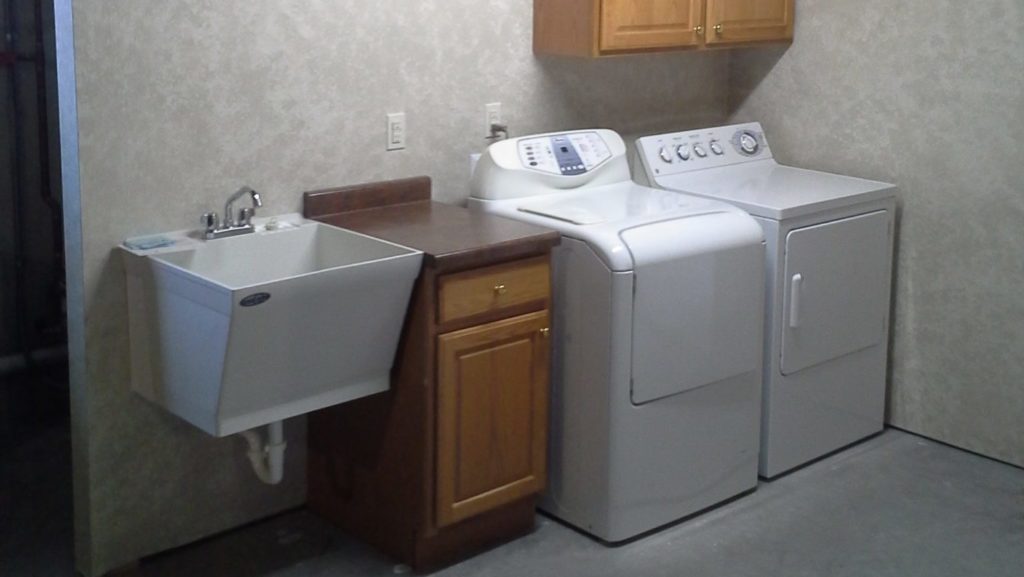A basement remodel is exciting for so many reasons. It’s a chance to get more room for an additional bedroom, rec space, bathroom, bar…the sky is the limit!
While the thought of more space is exciting, it can also be incredibly overwhelming staring at blank concrete walls. Where do you start the basement remodel? What is the first step in a basement renovation?
There is no doubt that a basement remodel is a big project with multiple steps. That’s why we’ve put together a basement remodeling guide that can get your basement remodel started. Once you get started, an experienced contractor can take over the process so you can enjoy your finished project.
Decide on what you need from your basement
The best way to address these questions is to ask more questions. Ask yourself, “What do I need from my basement? How much space do I have available? Is there an area that we don’t want to finish?”
These are tough questions, and a quick search for basement remodeling ideas can help (or make the decision harder!) Does your family need another bedroom? If so, make sure you have a space in the basement with a window big enough (and low enough) for a person to use to get out if there is an emergency. Do you need more storage? If so, consider adding lots of closets and cabinets or leaving an area unfinished for additional storage. Do you need an additional rec room that is an adults-only space? Or a man cave? Or does your family need a kids’ playroom? Or a rec room for both adults and kids?
The answers to all these questions can help you decide on the right floor plan for the finished basement. If there is limited space, these small basement remodeling ideas to create a space that feels bigger and suits multiple purposes. An experienced contractor can also make suggestions that you may not have considered—and make your new basement more functional and attractive.
Get project quotes
Once a basement floor plan is finalized (or close to finalized), it’s time to contact contractors to get a free quote. There are several ways to find the right contractor for the project. You can ask other friends and family members for names of contractors and look online.
There are a few things to watch out for during your search for a contractor. When asking for recommendations, always ask if the contractor has done work for the person. This small step ensures that the contractor has done good work in the past (and not just “my brother…” or “my friend’s cousin…”) No matter how you find the contractor (online or via a friend), always check online (i.e. on Yelp, Yellow Pages, Facebook, etc.) to make sure the contractor has good reviews and testimonials (or ask in-person).
In addition to asking for testimonials, ask every contractor these questions:
- How long you have been in business? How many basement remodels have you done?
- Do you apply for permits or should I?
- Are you insured?
- Can you provide references from past remodeling projects?
- How do you typically handle payments? (Be cautious about choosing contractors that require more than a 10% down payment.)
- Can you waterproof my basement before finishing it?
- Do you purchase materials for the basement remodel (i.e. flooring, cabinets, etc.) or do we?
- Can you keep my home clean during the remodel?
- How do you typically talk with your clients? How long until we receive a quote?
- If we choose you, what is your start date?
Think about other basement remodeling considerations
There are other unique items to consider during a basement remodel:
- Water. Because basements are below ground, basements are prone to flooding. That’s why it’s so important to make sure that any flooding concerns are minimized; after all, no one wants their newly finished basement to flood. You don’t want to have to finish a basement twice—or deal with flooding clean-up.
- Flooring. In addition to flooding, moisture is also a factor in choosing the right flooring for a basement. A concrete slab is porous, meaning that moisture is in continual contact with the floor. Since wood flooring can be damaged by moisture, hardwood floors are not a good fit for basements. However, there are several other floors that do work well in basements (and some resemble wood). Engineered wood flooring, luxury vinyl plank, and tile are all good flooring candidates for basements.
- Humidity. Even after waterproofing, many finished basements continue to have a higher level of humidity. Consider adding a built-in dehumidifier to your project or purchasing a free-standing model that ensures your finished basement stays in good shape.

